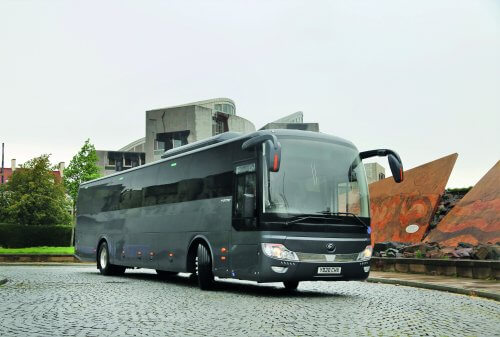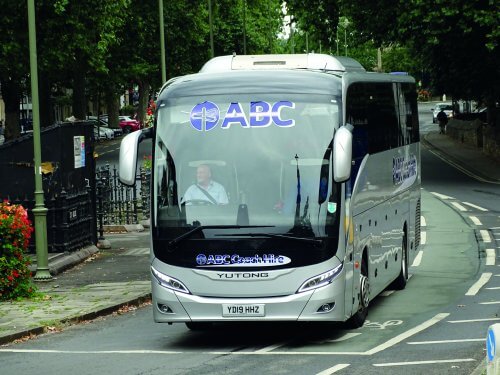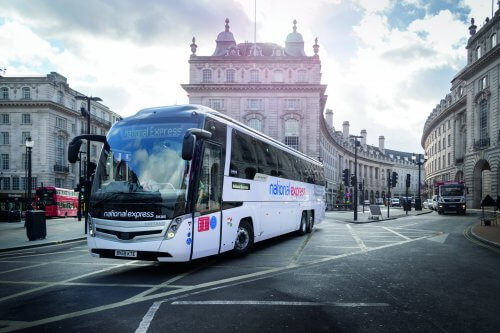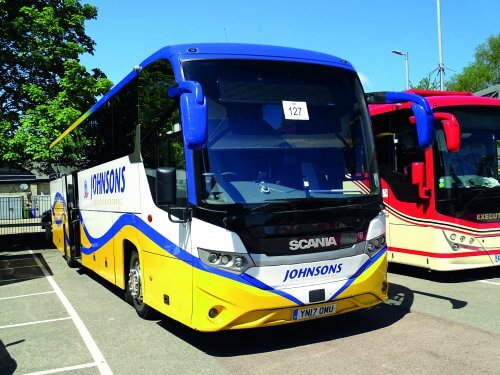
Following the recent online conference, Jonathan Welch looks at the CPT’s new coach decarbonisation taskforce
On Wednesday 1 December the CPT held its inaugural online conference looking at ways to decarbonise the coach industry and inform the Government’s roadmap for achieving the transition to a zero-emission coach fleet. Although Baroness Vere was unable to attend as scheduled, the conference heard from a number of voices from across the coach industry and beyond about how the move to zero emissions could look, and what is already taking place.
A number of sessions addressed the key barriers operators face to decarbonising their coach fleets, including concerns over the range of batteries on electric vehicles, the lack of on-route charging infrastructure, and the higher purchase price of zero-emission vehicles. Delegates heard from industry figures from companies including National Express, Yutong and the Green Finance Institute, as well as Andrew Westcott from taxi company Addison Lee who spoke about its pledge to use only electric vehicles from 2023 and how it has approached the challenges, to provide a different perspective.
[wlm_nonmember][…]
By subscribing you will benefit from:
- Operator & Supplier Profiles
- Face-to-Face Interviews
- Lastest News
- Test Drives and Reviews
- Legal Updates
- Route Focus
- Industry Insider Opinions
- Passenger Perspective
- Vehicle Launches
- and much more!
Following the conference, and in order to support the industry and help steer and inform the Government’s plans for the sector, the CPT has created an industry-wide coach decarbonisation taskforce to start to create the roadmap which will help operators decarbonise their fleets.
The taskforce is to be chaired by Ian Luckett of the Lucketts Travel Group and National Express. It will report to the CPT’s Coach Commission, will bring together operators, manufacturers and other experts, and plans to start by reviewing and evidencing the challenges the industry faces to decarbonising the fleet, building on the conclusions from the coach decarbonisation conference. Ultimately, the work will lead to a CPT report on potential solutions for the sector, due to be delivered in the summer of 2022 which will underpin the CPT’s engagement with governments across Britain on the issue.
Commenting on his appointment, Ian said: “I am delighted to be chairing the taskforce and look forwarding to working with my fellow taskforce members, CPT and other industry stakeholders. Decarbonising our world is essential and it’s vital our industry understands the part it needs to play on the journey to net zero. It must be clear not only about the challenges it faces, and what needs to happen to help it overcome them, but that it has evidence to back this up. I will be asking members of the taskforce to have this in mind from day one as we begin this exciting and important work.”
Initial members of the taskforce include Chris Owens of Alpine Travel; Martin MacPhail of MacPhail Coaches; Buta Atwal of Ryse, Dan Hayes from the Zemo Partnership; Ian Downie of Pelican Yutong; and Mark Ballam from ADL. The remit of the taskforce is to identify the hurdles in a number of areas. These include: Technology (battery-electric, hydrogen fuel-cell and other potential zero-emission technologies); charging infrastructure (electric and hydrogen) including on-route charging; costs, including economies of scale and warranties; finance, including suitable financial structures, products and guarantees; knowledge and experience of operation and skills gaps; vehicle and charging requirements in rural, island, and urban areas, and; insurance.

Conference
The aim of the conference was to start to determine the roadmap and how the coach industry, which was estimated to facilitate 500m journeys per year pre-pandemic, and which carries around 60,000 children to school daily, would take its first real steps towards decarbonisation. The sector is starting to see a change, such as National Express’ pledge to have a zero-emission coach fleet by 2035, but remains a long way behind the bus industry for a number of largely practical reasons, chiefly the problem of accommodating both sufficient battery capacity and maintaining space for high volumes of luggage, and lack of access to charging facilities away from home bases.
With the Government soon to consult on the date for an end to the sale of diesel buses, and looking to do the same for coaches in the near future, the CPT says that the road for the sector is somewhat more challenging and it is imperative that the industry identifies ways to work together with the Government to make the transition achievable and affordable. The conference focussed on some of the major aspects of the transition, including the vehicles themselves and the operational standpoint. Richard Ball, National Express’ New Vehicle Director, and 40-year veteran of the inter-city coach operator, shared some of that company’s views on the way forward, noting that what it does now will trickle down to the rest of the sector in a few years time as coaches are replaced and cascaded from the front line onto second-tier work. With this in mind, Richard encouraged operators to get in touch and share their views on what they are looking for from a coach, so that National Express can take those into consideration when investigating the market.
Richard commented that whilst the transition for the bus market has been relatively easy, there are currently no right-hand drive coaches available in Europe which would be able to satisfy the needs of an operator such as National Express on a wide portfolio of routes. He also noted that whilst diesel technology has been around for a century, it is only in the last two decades that there have been significant improvements in cleanliness, though these also brought about weight penalties which required redesign of coaches to continue to maintain high luggage capacities.
Easily overlooked, he also noted that not only is battery capacity and weight an issue, but also the operating environment. For coaches, especially on inter-city work, this can mean hours on a motorway on the limiter, rather than constant accelerating and braking of a city bus, thereby significantly reducing any opportunity for regeneration through braking. Hydrogen could represent the solution, he said, but that also represents significant engineering challenges both on and off the vehicle.

Hydrogen engines a no-go?
Another issue raised was that of hydrogen combustion engines, which are being developed as a potential alternative. Although using a hydrogen combustion engine does not produce CO2, it still produces NOx, thus does not solve the problem entirely.
Operators also called for manufacturers to start considering electric coaches holistically rather than attempting to electrify an existing design, which it was said can lead to compromises in packaging such as equipment encroaching on the passenger and luggage compartments. Stability needs to be factored in too, with the easy option of roof-mounted equipment not always being considered suitable.
Other issues raised which the Government must consider alongside the industry were those of fuelling, should hydrogen be adopted, and maintenance, which can also carry significant costs in preparing a depot for hydrogen-fuelled vehicles; costs which may be prohibitive to smaller operators and which may require Government support. A similar approach was called for as has been made with buses, with funding made available to prime the pump and bridge the gap between diesel and zero-emission coaches. It was also suggested that the Government should take a lead in developing a nationwide coordinated approach to hydrogen fuelling stations which could be used by both HGVs and PSVs.
Call for evidence
Another well-known body in the move to zero emissions is the Zemo Partnership, and which was represented by Programme Manager for bus and coach Dan Hayes who raised a number of issues. In light of the upcoming call for evidence on zero-emission coaches from the DfT, he urged the need to educate policy makers on the needs of the sector. The date has been set for cars, vans and HGVs to transition, but the time is now if the industry wants to ensure it has tome to plan, invest and make the changes in a sustainable and viable manner, he said. He also highlighted a number of perception challenges that the industry must tackle, sitting as it does in the eyes of many somewhere in the gap between buses, HGVs and private hire vehicles whilst not really gaining recognition or help from any of these sectors despite sharing similar needs with all of them.
Dan also highlighted the uphill struggle for the sector, in an environment where it is vying for the Government’s attention among much bigger players. The large number of small players, and the low overall number of vehicles, he said, could mean coaches are the last in the queue for funding, citing figures of around 28,500 coaches in the UK compared to almost 39,000 buses and over half a million HGVs.
Another key requirement is that there is also a need to ensure that policymakers understand that coaches are not buses when it comes to dealing with low emission zones and clean air zones, equally in terms of access to retrofit funding which can be difficult to obtain for coach operators.

Early adpoters
The current state of the coach industry when it comes to zero-emission coaches is rather lacking behind the bus sector: Ember operates its Dundee-Edinburgh service, with an initial fleet of two Yutong TCe12s loooking likely to be supplemented by more in the future. In the South East, Wesyway and Watts Way operate five more of the type between them, whilst a pair of Irizar i4 hybrids are in use by Centaur Travel on a Greenwich university contract. Scotland is currently leading the way in promoting green coaches, with grants available through SULEBS and around £180,000 available for electric coaches, or £220,000 for a hydrogen-fuelled one, along with supporting the cost of infrastructure.
An ongoing worry is that although technology is developing at a pace, it is still relatively early and many operators and suppliers are reluctant to commit to one technology for fear that it will be overtaken or simply to discover that the Government has chosen to take a different direction. To use a common phrase, it is the Betamax versus VHS problem, and this is something else which the taskforce will seek to address in moving the issue forwards, in line with a national zero-emission coach strategy which understands the issues and is able to set out the ambition and the requirements to get there as well as educating policy-makers and operators.
The question was raised of whether as part of this, the CPT could look at creating a national map of available infrastructure, to include facilities such as charging points and hydrogen fuelling points, to enable operators to see what is available when planning journeys and to engage and work with operators in other part of the country to make the move to zero-emissions more achievable.
Economies of scale
Fielding questions from viewers, Pelican Yutong’s Ian Downie explained that he believes that even with an uptick in the number of zero-emissions coaches sold, the price is unlikely to reduce significantly. Whilst there would be an increased economy of scale on a local level, he pointed out that Yutong has already produced 127,000 electric vehicles across its markets, and that operators must for their part start to consider the total cost of ownership rather than purchase price.
Concluding the conference and commenting on the launch, CPT Chief Executive Graham Vidler said he was delighted that Ian had agreed to chair the taskforce which he believed will be invaluable as the sector moves forwards: “CPT is launching this taskforce to help our members get ahead of what will be a transformational issue for the industry over the coming decades. The taskforce will start with a forensic examination of the issues ahead. This is a crucial first step in helping us develop sustainable and deliverable solutions which will help the industry on its journey to net zero.”
Voices from other areas of the zero-emission economy also provided input into the session, with discussions including the financing of EVs and infrastructure, as well as sharing experience in other related industries such as the private hire car sector. To find out more, or to join the CPT and take part in shaping the future of coaching, visit cpt-uk.org.
[/wlm_ismember]


